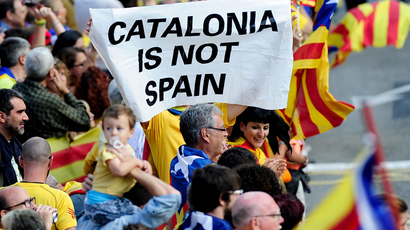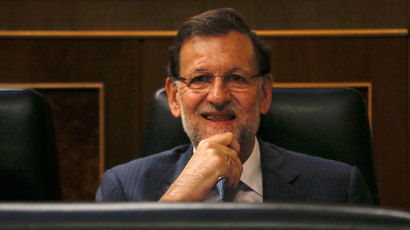Spain ‘won’t have enough tanks’: Catalonia to vote on independence, defy Madrid
The Catalan regional parliament has set November next year for a referendum on the Spanish province’s independence. The government in Madrid blandly said the vote won’t happen, but activists wonder how it might be stopped.
Catalonia’s four pro-independence parties, which hold a majority in the regional parliament, announced Thursday that the rich industrial Spanish province will hold a referendum on whether to gain greater autonomy or even total independence from the country’s central government.
The vote’s preliminary date is November 9, Catalan regional government head Artur Mas said. The people will be asked two questions: "Do you want Catalonia to be a state?" and "Do you want that state to be independent?"
The former question was added for those Catalans who seek to change Spain into a federation, with Catalonia forming part of it. According to a Metroscopia poll in newspaper El Pais last month, 46 percent of Catalans favor separatism versus 42 percent who wish to remain within Spain. The support for greater autonomy, however, is very strong.
Just minutes after the announcement Spanish Justice Minister Alberto Ruiz-Gallardon rejected the idea, saying it would be unconstitutional.
"The vote will not be held," he said.
Prime Minister Mariano Rajoy spoke out later in the day, saying his government will not allow the Catalan referendum to happen.
"As prime minister I have sworn to uphold the constitution and the law and, because of this, I guarantee that this referendum will not happen," he stressed. "Any discussion or debate on this is out of the question."
But in Catalonia pro-independence moods are not withered by Madrid’s rebuke. They say the central government would have little options, if it does want to stop the referendum.
"They will have to show how they are going to prevent a vote from happening,” Elisenda Paluzie, professor of economics at the University of Barcelona, told RT. “What are they going to do? Will they send the police to the polling stations? It's up to them to show what kind of democracy they support."
Catalonia, a land with strong cultural roots and its own language, has had strong pro-independence sentiment for decades and shares a painful history with the rest of Spain. It was oppressed during the rule of military dictator Francisco Franco (1939-75), who stripped it of autonomous powers and issued a ban on Catalan language to fight separatist tendencies.

The situation now is different however, and Catalans don’t believe that Madrid would use force to block their independence aspirations.
"If Spanish tanks rumbled into Barcelona, like they did in 1939, there wouldn't be enough tanks to go around. There wouldn't be enough soldiers to go around. Spain, being a modern country, has drastically reduced its armed forces," Miquel Strubell, member of a pro-independence grassroots organization, the Catalan National Assembly, said to RT.
In modern Spain, Catalonia renewed autonomy and currently governs itself in areas like health and education. It has a regional parliament and maintains its own police force. But the calls for independence from Madrid has gained stronger support in the last few years, as Catalans complained that it is being drained of tax money, which is spent in other Spanish regions.
The situation is aggravated by the economic crisis, which forces the Rajoy government to adopt painful austerity policies. But financial considerations are not the prime reason why Catalans seek independence, says Strubell.
“I think most of my colleagues would agree that this isn't about money. It's about a much more basic issue of running our own things," he assured "It's all been on the cards for years. It all started before 2003, which is well before the economic crisis."
The referendum in Catalonia will be held less than a month after a similar vote in Scotland, which will hold it on September 18. Joan Maria Pique, a top aide and spokesman for Catalan President Mas, criticized the Spanish government, saying that London agreed to the Scottish vote on self-determination, while Madrid is reluctant to do the same for Catalonia.
"We expect to open negotiations with Madrid. The Spanish state can't be blind about it," he said.














